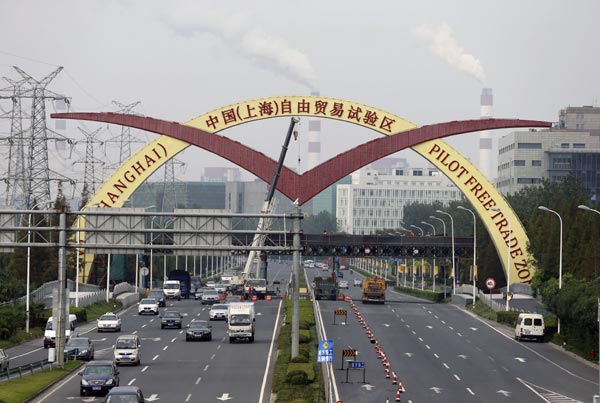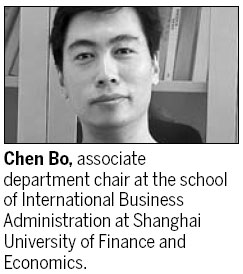Pilot FTZ to build open economy
Editor's Note: As preparations for the China (Shanghai) Pilot Free Trade Zone are entering the final stage ahead of its unveiling ceremony on Sunday, China Daily invited a number of business leaders and experts to share their thoughts on how this ground-breaking project will shape their future plans that target the Chinese market. Their comments should serve as a useful reference point for those attempting to grasp the magnitude of the project and its far-reaching significance for the future development of the Chinese economy.
|
 The gate of the China (Shanghai) Pilot Free Trade Zone on Yanggao Road N. in Pudong. Zhao Yun / For China Daily |

The zone should include all major industries to create competition
The decision to establish a pilot free trade zone in Shanghai stems from a number of internal and external problems that China now faces.
While slowing economic growth is forcing the country to seek out deeper reforms and new growth engines, external moves that could be billed as "foreign aggression" have had a bigger hand in prompting the creation of the FTZ.
The influence of the Trans-Pacific Partnership Agreement (TPP), initiated by Singapore in 2005, was greatly enhanced after the United States signed up in 2008. Ever since, the TPP has moved in tandem with American interests.
As part of its bid to build a unified market in the Pacific Rim by 2020, the TPP requires member countries to eliminate all tariffs and open up their agricultural and financial services sectors. As such, Japan and developing countries like China have found themselves in the crosshairs.
The US-influenced TPP did not receive a positive response from Asia-Pacific countries at first. But with the US forcing Japan and Vietnam to join the negotiations - it also signed an FTA with South Korea in October 2011 - China has had to reconsider its position. China knows it will pay a higher price if it is excluded from such a unified market.
China expressed interest in joining the TPP for the first time during a fresh round of Sino-US strategic economic dialogue in July. However, time is of the essence if it hopes to meet the TPP's requirements for full liberalization before the 2020 deadline.

























